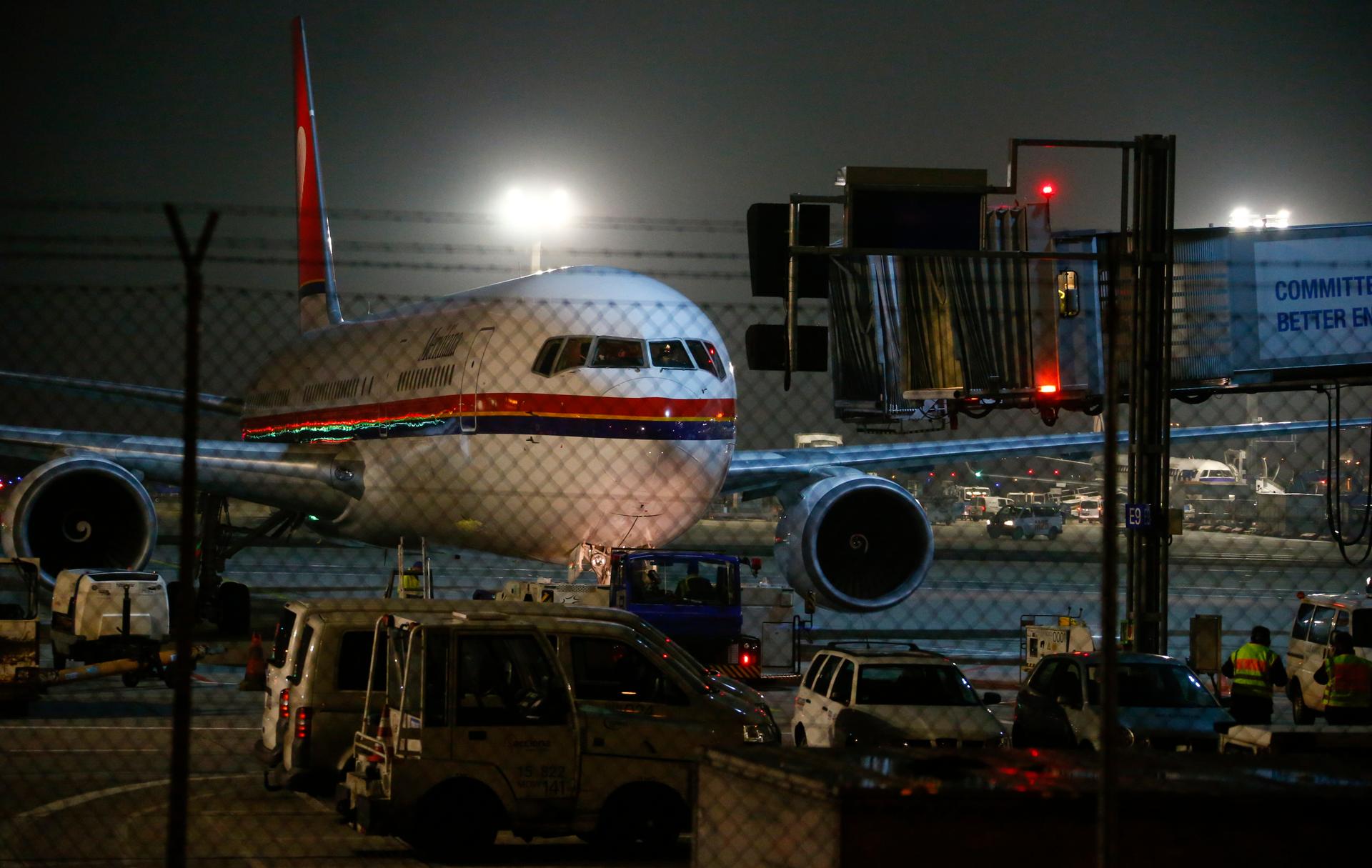A Meridiana Airlines plane believed to be flying a group of about 50 rejected asylum-seekers leaves from Frankfurt Rhein-Main Airport in Germany, Dec. 14, 2016.
Last week, German media reported that some pilots have refused to carry out deportations of Afghan refugees.
"Following an information request from the Left party," reported Deutsche Welle, "the government said that 222 planned expulsions were stopped by pilots."
While it may seem the pilots are refusing to fly Afghan refugees back to Afghanistan out of sympathy, that's not the only reason.
There are security reasons behind their decisions as well, according to Bernd Mesovic, deputy director for Pro Asyl, a pro-immigration advocacy group in Germany.
He points to two incidents on Lufthansa flights as examples. One happened in 1999, when 30-year-old Aamir Ageeb, a Sudanese refugee, was put on a flight back to Sudan. After he resisted, German security guards bound his hands and feet to his seat and placed a helmet on his head. Shortly after takeoff, he was found dead, suffocated.
"Regular passengers became witness of the drama," says Mesovic. "Bad publicity for Lufthansa, which is not a low-budget airline."
Ageeb's death was a PR nightmare for Lufthansa, so the airline decided to change its policy on how it handles rejected asylum-seekers. Today, the pilot makes the decision on whether a passenger can fly.
"Before the plane is boarded by regular passengers," explains Mesovic, "the border police accompanies the deportee inside and usually gives last-minute information to airline staff in addition to what has been communicated concerning the passenger beforehand."
"If there is any doubt in connection to security questions, the captain himself should have an eye on it and decide upon possible risks," says Mesovic.
The thinking is that when a refugee is put on a flight back to a place he fled, he might become distraught and potentially pose a threat to himself or others.
Ramin Mohabat is an Afghan who was given 30 days to return to Afghanistan. Mohabat was a journalist in Herat, and the Taliban went after him after he published a few stories they didn't like. He feared for his life and he says he had no choice but to leave.
The journey to Germany was not easy. "I saw death with my own eyes," he recalls. He witnessed the death of two people on the border of Iran and Turkey and almost drowned making his way from Turkey to Greece on a rickety boat.
He finally made it to Germany.
But after two years of living in limbo, awaiting response for his asylum application, he received a letter from the German government giving him 30 days to leave.
"It was a shock," he says, "I couldn't believe my eyes."
Mohabat sprung into action. He learned his application was rejected because the press clips he had filed along with his application hadn't made it to the final dossier. He asked for a second interview and he rushed to re-organize the clips and get them ready.
He managed to convince the interviewee that his life is in danger in Afghanistan and that he should stay in Germany.
But, he says, he's lucky. He says he knows others who could be deported any day. Many don't speak German and are not in a position to fight their deportation.
Wenzel Michalski, Germany director for Human Rights Watch, says the German government claims it only deports Afghans who have committed a crime in Germany or those who don't face imminent danger in Afghanistan.
Mohabat, on the other hand, argues sometimes the "crimes" don't fit the punishment. For example, he says, if you ride the train without a ticket, you could end up facing deportation.
Meanwhile, in its long-term plan to reduce the number of refugee asylum applications, the German government has also come up with a payment plan for refugees who voluntarily withdraw their applications.
About 1.6 million people sought asylum in Germany at the end of 2016, according to the Federal Statistical Office of Germany. Since 2014, the number of asylum seekers in Germany has increased by 113 percent. The majority of the cases were filed by Syrians, but Afghans filed the second most applications.
The German government has dubbed the cash scheme "Your country. Your future. Now!” and it offers $1,185 to individuals who volunteer to go back and around $3,500 to families who do the same.
Mohabat says part of the payment is offered in Germany, prior to the asylum-seeker's departure and the rest is paid once they return home. He questions the practicality of the second payment, given the rampant corruption in Afghanistan.
For now, Mohabat wants to focus on life in Germany. He has been taking language classes and is working part-time as a photographer for his local municipality.
Asked what he would say to the pilots who have been refusing to fly back refugees, he said he would make them a big batch of saffron tea and offer them Afghan sweets.
"Because they know that Afghanistan is not a safe place to return to," he says.
The story you just read is accessible and free to all because thousands of listeners and readers contribute to our nonprofit newsroom. We go deep to bring you the human-centered international reporting that you know you can trust. To do this work and to do it well, we rely on the support of our listeners. If you appreciated our coverage this year, if there was a story that made you pause or a song that moved you, would you consider making a gift to sustain our work through 2024 and beyond?
